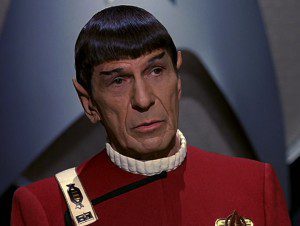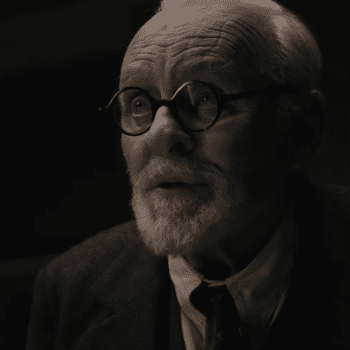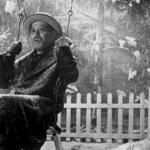 Leonard Nimoy died earlier today at the age of 83. He was, according to the obituaries I’ve seen, a man of many talents: poet, photographer, musician. But it was as an actor that most of us knew him first and best—an actor who became famous for one role. Mr. Spock of Star Trek.
Leonard Nimoy died earlier today at the age of 83. He was, according to the obituaries I’ve seen, a man of many talents: poet, photographer, musician. But it was as an actor that most of us knew him first and best—an actor who became famous for one role. Mr. Spock of Star Trek.
A few years ago, I wrote a book proposal that probed spirituality from the deck of the Enterprise—a show created by Gene Roddenberry, one of the world’s best-known humanists (and no fan of organized religion). And no one was more compelling from a spiritual angle than Spock.
If anyone would seem prone to atheism, you’d think it would be Star Trek’s favorite vulcan, he of the eminently logical mind and lover of empirical data. The Vulcan culture banished emotion eons ago, and religion is a deeply passionate impulse. Given how often popular culture and modern media pit science against faith, you’d think that spirituality and our scientific Spock would be incompatible.
But Vulcans, according to the exhaustive Star Trek wiki Memory Alpha, have deeply religious roots. Their famous hand signal is said to b e based on the Jewish rabbinic sign for “Shaddai,” a name of God. Their society is steeped in tradition and ceremony, thoughtful reflection and a rejection of unhealthy passion—which echoes James 1:15: “After desire has conceived, it gives birth to sin, and sin, when it is full grown, gives birth to death.” Any Vulcan could have written this statement from fourth-century Christian recluse (and one of the fathers of monasticism) John of Lycopolis: “Everyone who has not renounced the world fully and completely but chases after its attractions suffers from spiritual instability. His preoccupations, being bodily and earthly, distract his mind through the many enterprises in which he is engaged.” It’s no coincidence that, for a couple of movies, Spock dresses very much like a monk.
Would Spock’s logic keep him from seeing spiritual truth? I don’t think so. In fact, it might be prepare him for it better. In my sadly unsold book, I drew some parallels between Spock and Digory Kirke, the old professor in C.S. Lewis’ classic Narnia tale The Lion, the Witch and the Wardrobe:
“Logic!” exclaims Professor Digory Kirke. “Why don’t they teach logic at these schools?”
Professor Kirke is a man after Spock’s own green heart. He’s quite old, very kind and incredibly smart, and when Peter and Susan Pevensie need help figuring out how to help their younger sister, Lucy—a girl who has suddenly been blathering about some strange, snowy world called Narnia locked behind a wardrobe door—they turn to the white-haired prof for help. How should they handle these incredible lies? Or what if Lucy doesn’t realize she’s lying? What if she’s losing her mind?
After pondering the situation for a while and clearing his throat, Professor Kirke asked a deceptively simple question in return.
“How do you know that your sister’s story is not true?”
Peter and Susan are flabbergasted, but Professor Kirke swiftly—logically—takes them step-by-step through a process wherein it seems as though Narnia might not be so illogical after all.
“There are only three possibilities,” the Professor concludes. “Either your sister is telling lies, or she is mad, or she is telling the truth. You know she doesn’t tell lies and it is obvious that she is not mad. For the moment then and unless any further evidence turns up, we must assume she is telling the truth.”
In 2009’s Star Trek, a young Mr. Spock—a Spock before the whales and Wyatt and all his other adventures—contemplates a seriously pressing problem: How did a Romulan mining ship come to possess a previously unknown doomsday weapon that, just minutes before, destroyed Spock’s home planet of Vulcan? Could such a weapon be hidden? The product of an unknown alien race? Spock quickly discards hypothesis after hypotheses for one that’s merely outlandish: The Romulan craft, somehow and for some unknown reason, must’ve come from the future. And in explaining himself to the crew, the Vulcan does a remarkably cogent impression of Professor Kirke.
“If you eliminate the impossible, whatever remains—however improbable—must be the truth,” Spock says.
I believe in God and Christianity not because it makes me feel good, but because I believe it to be true. I believe it to make sense. I believe it’s logical. I don’t know if I learned that from Spock … but his example sure didn’t hurt.
I could go on. Spock’s near inability to lie. His rejection of excess. His selfless act of sacrifice in Star Trek II: The Wrath of Khan, in which he becomes nearly a Christ-like avatar. Spock is not a Christian. But as embodied by Leonard Nimoy, he embodied Christian values better than most of us.













